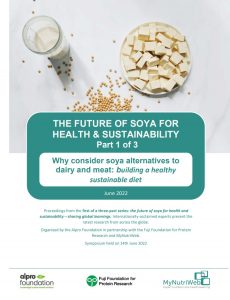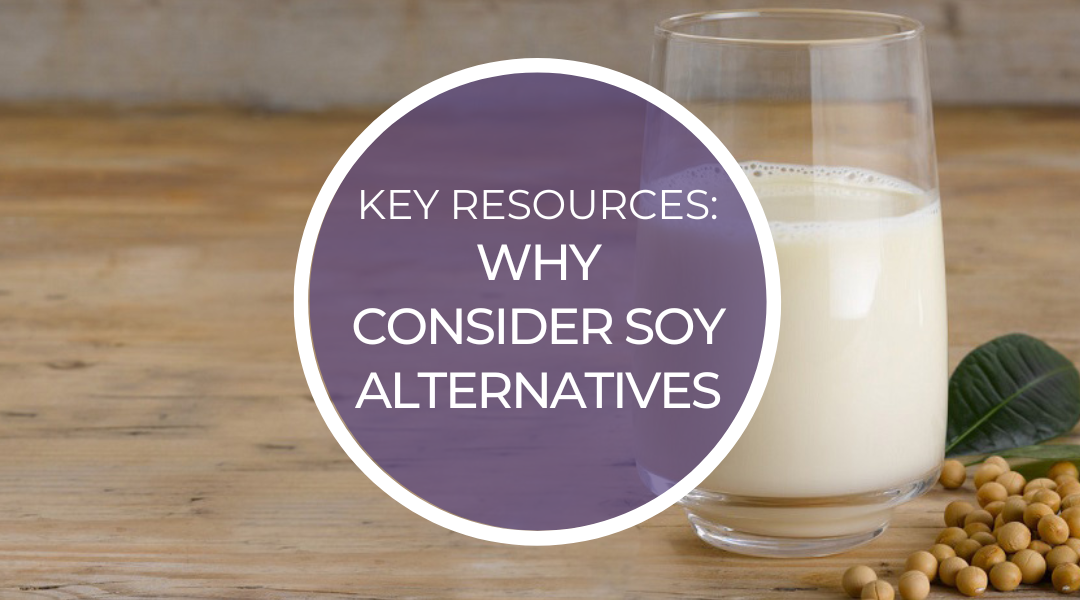Following on from our webinar ’Why consider soy alternatives to dairy and meat’, we’ve pulled together some of the key resources and references discussed within the webinar, plus some additional ones on the topic. We have also included useful websites and social media accounts recommended to keep up to date on the subject. If you missed the live webinar, you can watch the recording.
WEBINAR REPORT AND Q&A DOCUMENT
The Future of Soya for Health and Sustainability Part 1 of 3 – Why consider soya alternatives to dairy and meat: building a healthy sustainable diet (2022). MyNutriWeb, Alpro Foundation and Fuji Foundation for Protein Research. Proceedings from the first of the three part series. Internationally-acclaimed experts present the latest research from across the globe
Questions and Answers: Fuji and Alpro Soya Symposium Series 1 of 3 (2022). MyNutriWeb, Alpro Foundation and Fuji Foundation for Protein Research. Q&As from the event
GUIDELINES AND RESEARCH PAPERS
Association of soy food with cardiovascular outcomes and all-cause mortality in a Chinese population (2022). Xue T et al. A nationwide prospective cohort study showing high soy intake was associated with a reduced risk of total CVD events
Reversing the nitrogen crisis with sustainable diets report (2021). The Alpro Foundation. A 2021 Alpro Foundation fully referenced scientific report
Neither soyfoods nor isoflavones warrant classification as endocrine disruptors: a technical review of the observational and clinical data (2021). Messina et al. Effects of soy mediated by isoflavones
A Narrative Review of the Role of Diet and Lifestyle Factors in the Development and Prevention of Endometrial Cancer (2021). Zhang et al. Dietary and lifestyle factors that promote and prevent the incidence of endometrial cancer
The Effect of Soy Isoflavones on Arterial Stiffness (2021). Man et al. Meta-analysis showing significant improvements in arterial stiffness
Protein digestibility-corrected amino acid scores (PDCAAS) for soy protein isolates and concentrate: criteria for evaluation (2011). Hughes et al. Includes the protein digestibility-corrected amino acid scores of various proteins
Soy isoflavones consumption and risk of breast cancer incidence or recurrence (2010). Dong J et al. A meta-analysis of prospective studies
Food Planet Health (2019). EAT Lancet. Summary report of the EAT-Lancet Commission
Dietary isoflavones or isoflavone-rich food intake and breast cancer risk: A meta-analysis of prospective cohort studies (2019). Zhao et al. Meta-analysis indicating that women with a high dietary intake of soy foods may experience a statistically significant reduction in breast cancer risk
A Meta-Analysis of 46 Studies Identified by the FDA Demonstrates that Soy Protein Decreases Circulating LDL and Total Cholesterol Concentrations in Adults (2019). Meija et al. Study showing cardiovascular benefits of soy consumption
Consumption of a soy drink has no effect on cognitive function but may alleviate vasomotor symptoms in post-menopausal women; a randomised trial (2019). Furlong et al. Study showing that soy drink consumption had no effect on cognitive function in post-menopausal women
No Difference Between the Effects of Supplementing With Soy Protein Versus Animal Protein on Gains in Muscle Mass and Strength in Response to Resistance Exercise (2018). Messina M. Study showing the role of soy protein for muscle mass gains
The role of trade in the greenhouse gas footprints of EU diets (2018). Sandstrom et al. Study showing trade and countries of origin impact GHG footprint calculation for EU food consumption
Reducing food’s environmental impacts through producers and consumers (2018). Poore J et al. Soy vs dairy milk and sustainability
Soy Consumption and the Risk of Prostate Cancer (2018). Applegate et al. Study showing beneficial effects on soy intake and prostate cancer
National Health and Nutrition Survey (2017). Ministry of Health. Survey report to understand people’s health, nutritional intake, and lifestyle habits
Muscle strength gains during resistance exercise training are attenuated with soy compared with dairy or usual protein intake in older adults (2016). Thomson et al. Randomised controlled trial showing soy is just as beneficial (vs animal protein) for muscle strength gains
Association between Soy Isoflavone Intake and Breast Cancer Risk for Pre- and Post-Menopausal Women (2014). Chen et al. A Meta-Analysis of Epidemiological Studies
Protein intake and exercise for optimal muscle function with aging (2014). Duetz et al. Recommendations from the ESPEN Expert Group
Effect of soy isolate protein and resistance exercises on muscle performance and bone health of osteopenic/osteoporotic post-menopausal women (2013). Orsatti et al. The role of soy protein in middle aged women
Extracted or synthesized soybean isoflavones reduce menopausal hot flash frequency and severity (2012). Taku et al. Ssystematic review and meta-analysis of randomized controlled trials
Dietary patterns and breast cancer risk in Asian American women (2009). Wu et al. Results suggesting that a diet characterised by a low intake of meat/starches and a high intake of legumes is associated with a reduced risk of breast cancer
Adolescent and adult soy food intake and breast cancer risk: results from the Shanghai Women’s Health Study (2009). Lee et al. Prospective cohort study providing strong evidence of a protective effect of soy food intake against premenopausal breast cancer
Epidemiology of soy exposures and breast cancer risk (2008). Evidence supporting that soy food intake in the amount consumed in Asian populations may have protective effects against breast cancer
Soya and Health (2002). British Nutrition Foundation
PRACTICAL RESOURCES
The Eatwell Guide (2019). The National Health Service (NHS). Practical guide to healthy eating
Soya Foods (2017). The British Dietetic Association. Food fact sheet
The Composition of Foods 7th Edition. (2014). McCance & Widdowson. Composition of foods, including soya composition
Dairy and alternatives in your diet. NHS. Dietary information including soya as an alternative to dairy foods
Is Soya Good Or Bad For Your Health? Rhitrition. Useful Q&A article
Soy. The Vegan RD. Lots of useful practical information around soy foods
ALPRO FOUNDATION & FUJI FOUNDATION FOR PROTEIN RESEARCH
RELATED MYNUTRIWEB CONTENT
Shifting Food Systems (2021). E-symposium with leading experts about sustainable eating, including a practical interview on transitioning towards a plant-based diet and supporting resource blog
Changing Behaviours: From Policy to Table (2021) – Half day e-symposium looking into sustainable eating and the role of behaviour change and supporting resource blog
ROUNDTABLE ON SOYA NUTRITION HEALTH AND SUSTAINABILITY (2021). Internationally acclaimed expert panel of academics, doctors, and nutritionists discussing the very latest research in an accessible way
SOYA IS SAFE AND HEALTHY (2021). Article around new report on soya and health
The Truth About Soya (2020). 60 mins webinar with Mark Messina exploring the health of soya
Sustainable Healthy Eating – What Does this Really Look Like? (2019) – 60 mins webinar with Dr Fabrice Declerck and RD Elphee Medici
Sustainable Diets – BDA One Blue Dot Webinar (2019) – 60 mins webinar with Tom Embury, Clare Pettinger and Lynne Garton






